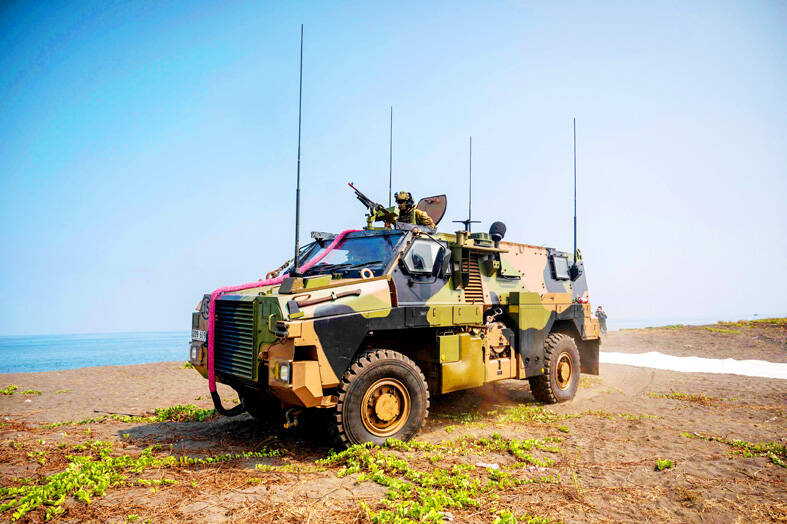The Indonesian and Australian militaries yesterday began joint combat drills off Indonesia’s main island of Java with about 2,000 troops training in air, maritime, amphibious and land operations.
They are participating in a live-fire exercise near Banongan beach of East Java’s Situbondo district with tanks, artillery, infantry and attack helicopters, a joint landing operation and a non-combat evacuation used for a disaster.
The four-day Keris Woomera 2024 (KW24) exercise highlighted the cooperation between the countries strengthened by the signing of the Australia-Indonesia Defense Cooperation Agreement in August.

Photo: AFP
Although Indonesia is often presented as one of Australia’s most important neighbors and strategic allies, the relationship has fluctuated.
Recent disagreements include allegations that Australia had wiretapped private phone calls of a past Indonesian president, Indonesia’s use of capital punishment on Australian drug smugglers and the smuggling of migrants.
“This joint exercise aimed to strengthening the partnership between Indonesia and Australia as we are building trust and to increase capabilities and interoperability,” said Indonesian Lieutenant Colonel Empri Airudin, who leads the Indonesian delegation.
“It can also be regarded as a way of maintaining security and stability in the region,” Airudin said.
The exercise is also part of Indo-Pacific Endeavour 2024, Australia’s largest international engagement activity in the region, taking place in Australia and Indonesia, Australian Amphibious Task Force Commander Captain Chris Doherty told reporters.
“This bilateral exercise will test all facets of the Australian Amphibious Task Force, and allow all its components to work effectively together as a cohesive team with our Indonesian partners,” he said, adding that the KW24 could provide the troops of the two nations with the ability to rapidly deploy forces in response to a range of missions.
Analysts consider Indonesia’s defense a priority of Indonesian President Prabowo Subianto. He wants to expand his military by buying submarines, frigates and fighter jets, and wants to initiate more defense cooperation with various countries.
Indonesia has held military exercises with other countries, including the Russian navy on Monday last week in Indonesia’s East Java seas.
Last month, Indonesia said its patrol ships drove away a Chinese coast guard ship that disrupted a survey being undertaken by a state-owned energy company in a part of the South China Sea disputed by both countries.
China has rapidly expanded its military and has become increasingly assertive in pursuing territorial claims in the South China Sea, which Beijing claims virtually in its entirety. The tensions have led to more frequent confrontations, primarily with the Philippines and Vietnam, though the longtime territorial disputes also involve Taiwan, Malaysia, Indonesia and Brunei.
However, during Subianto’s first overseas visit as Indonesia’s new leader to Beijing during weekend, he called for collaboration rather than confrontation with China after the signing of US$10 billion in new deals at a business forum before departing to the US on Sunday.
He and Chinese President Xi Jinping (習近平) agreed to hold a first-ever joint meeting of their foreign and defense ministers next year.

The Burmese junta has said that detained former leader Aung San Suu Kyi is “in good health,” a day after her son said he has received little information about the 80-year-old’s condition and fears she could die without him knowing. In an interview in Tokyo earlier this week, Kim Aris said he had not heard from his mother in years and believes she is being held incommunicado in the capital, Naypyidaw. Aung San Suu Kyi, a Nobel Peace Prize laureate, was detained after a 2021 military coup that ousted her elected civilian government and sparked a civil war. She is serving a

REVENGE: Trump said he had the support of the Syrian government for the strikes, which took place in response to an Islamic State attack on US soldiers last week The US launched large-scale airstrikes on more than 70 targets across Syria, the Pentagon said on Friday, fulfilling US President Donald Trump’s vow to strike back after the killing of two US soldiers. “This is not the beginning of a war — it is a declaration of vengeance,” US Secretary of Defense Pete Hegseth wrote on social media. “Today, we hunted and we killed our enemies. Lots of them. And we will continue.” The US Central Command said that fighter jets, attack helicopters and artillery targeted ISIS infrastructure and weapon sites. “All terrorists who are evil enough to attack Americans are hereby warned

Seven wild Asiatic elephants were killed and a calf was injured when a high-speed passenger train collided with a herd crossing the tracks in India’s northeastern state of Assam early yesterday, local authorities said. The train driver spotted the herd of about 100 elephants and used the emergency brakes, but the train still hit some of the animals, Indian Railways spokesman Kapinjal Kishore Sharma told reporters. Five train coaches and the engine derailed following the impact, but there were no human casualties, Sharma said. Veterinarians carried out autopsies on the dead elephants, which were to be buried later in the day. The accident site

RUSHED: The US pushed for the October deal to be ready for a ceremony with Trump, but sometimes it takes time to create an agreement that can hold, a Thai official said Defense officials from Thailand and Cambodia are to meet tomorrow to discuss the possibility of resuming a ceasefire between the two countries, Thailand’s top diplomat said yesterday, as border fighting entered a third week. A ceasefire agreement in October was rushed to ensure it could be witnessed by US President Donald Trump and lacked sufficient details to ensure the deal to end the armed conflict would hold, Thai Minister of Foreign Affairs Sihasak Phuangketkeow said after an ASEAN foreign ministers’ meeting in Kuala Lumpur. The two countries agreed to hold talks using their General Border Committee, an established bilateral mechanism, with Thailand